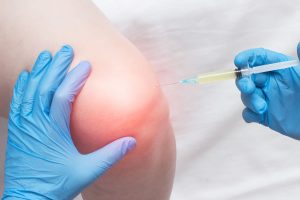- 27 February 2024
- 92
Feeling at Ease: Exploring the Safety of Knee Arthritis Shots

Introduction
In recent years, the treatment landscape for knee arthritis has seen significant advancements, offering patients relief from pain and improved mobility. One of the most promising treatments is knee arthritis shots, which have garnered attention for their efficacy in reducing inflammation and discomfort. In this comprehensive guide, we delve into the safety aspects of knee arthritis shots, providing insights into their administration, potential side effects, and overall safety profile. Explore More About (Poliovirus in Waste Water)
Understanding Knee Arthritis Shots
What are Knee Arthritis Shots?
Knee arthritis shots, also known as intra-articular injections, involve the direct delivery of medication into the affected knee joint. These injections typically contain corticosteroids, hyaluronic acid, or platelet-rich plasma (PRP), each with unique mechanisms of action in alleviating pain and inflammation associated with knee arthritis.
How do They Work?
Corticosteroids function by suppressing inflammation in the joint, thereby reducing pain and swelling. Hyaluronic acid injections aim to restore the lubricating properties of synovial fluid, cushioning the joint and improving mobility. PRP injections utilize the body’s own healing factors to promote tissue regeneration and reduce inflammation in the joint.

Safety Considerations
Administration Procedure
Knee arthritis shots are typically administered by trained healthcare professionals, such as rheumatologists or orthopedic surgeons, in a clinical setting. Prior to the injection, the area around the knee is cleaned and sterilized to minimize the risk of infection. The injection is then performed using a fine needle under sterile conditions to ensure safety and efficacy.
Potential Side Effects
While knee arthritis shots are generally considered safe, they may be associated with certain side effects. Common side effects include temporary pain or discomfort at the injection site, mild swelling, and bruising. In some cases, patients may experience a temporary increase in joint pain following the injection, which usually resolves within a few days. Serious side effects such as infection or allergic reaction are rare but should be promptly reported to a healthcare provider.
Patient Considerations
Before undergoing knee arthritis shots, patients should discuss their medical history and any underlying health conditions with their healthcare provider. Individuals with a history of allergies, bleeding disorders, or certain medical conditions may not be suitable candidates for this treatment. Additionally, pregnant or breastfeeding women should consult their healthcare provider before receiving knee arthritis shots.
Benefits of Knee Arthritis Shots
Pain Relief
One of the primary benefits of knee arthritis shots is their ability to provide effective pain relief for individuals with knee arthritis. By targeting inflammation within the joint, these injections can significantly reduce pain and discomfort, allowing patients to engage in daily activities with greater ease.
Improved Functionality
In addition to pain relief, knee arthritis shots can also improve joint functionality and mobility. By reducing inflammation and promoting tissue healing, these injections may enhance the range of motion in the affected knee joint, enabling patients to perform tasks such as walking, climbing stairs, and bending with greater ease.
Minimally Invasive
Compared to surgical interventions such as knee replacement surgery, knee arthritis shots offer a minimally invasive treatment option for managing knee arthritis. With no incisions or lengthy recovery periods required, patients can undergo these injections on an outpatient basis and resume their normal activities shortly afterward.

| Treatment Option | Mechanism of Action | Side Effects | Suitability |
|---|---|---|---|
| Corticosteroid Injections | Suppress inflammation | Temporary pain, swelling, bruising | Individuals with allergies, bleeding disorders |
| Hyaluronic Acid Injections | Restore lubrication of synovial fluid | Temporary pain, swelling, bruising | Individuals with allergies to avian products |
| Platelet-Rich Plasma (PRP) Injections | Promote tissue regeneration | Temporary pain, swelling, bruising | Individuals with bleeding disorders, certain medical conditions |
Conclusion
In conclusion, knee arthritis shots represent a safe and effective treatment option for individuals seeking relief from knee arthritis symptoms. By targeting inflammation and promoting tissue healing within the joint, these injections offer significant benefits in terms of pain relief, improved functionality, and minimally invasive treatment. While side effects may occur, they are typically mild and transient, with serious complications being rare. Overall, knee arthritis shots provide patients with a valuable tool in managing the symptoms of knee arthritis and improving their quality of life.
For more information on knee arthritis shots and other treatment options, consult with a qualified healthcare provider.

